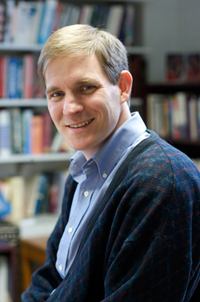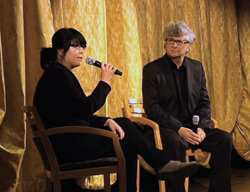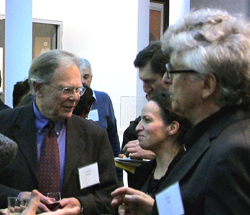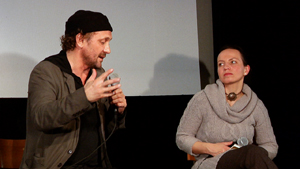From the Director
By Randall Stone

Randall Stone, Director of the Skalny Center
How will Europe respond? Past crises have tended to push the Europeans to embrace further integration, often leading to steps that were thought to be politically impossible before the crisis broke. On the other hand, the currency crisis that drove the United Kingdom to exit the European Monetary System in 1992 stands as a counterexample. German Chancellor Angela Merkel seems determined to follow positive precedents, maintaining that the solution is “More Europe, not less.” The dilemmas involved in building a durable financial infrastructure, however, go far beyond the

Opening of the Polish Film Festival. Feliks Falk and Lori Donnelly, Film Programmer at George Eastman House

Opening of the Polish Film Festival. From left: Frederic Skalny, Anna Niedźwiedź, and Feliks Falk.
We began the fall with a film presentation and lecture by Professor Marek Hendrykowski of Adam Mickiewicz University in Poznań, Poland. The film, “The Photograph” (Zdjęcie, 1968) was the recently rediscovered first movie by Krzysztof Kieślowski. It is a documentary about Kieślowski’s effort to discover the truth about an iconic photograph from 1945 that showed two Polish boys proudly displaying Soviet Army gear and weapons after Soviet troops entered Warsaw. The film is poignant with historical judgment and irony, although the director/protagonist allows this to emerge from his seemingly harmless interviews with ordinary people. The film somehow passed the censors and was shown on Polish television in the Gierek era, but was quickly suppressed by the Communist authorities. There followed a presentation by Kathleen Parthé, Professor of Russian and Director of Russian Studies at the University of Rochester, about Russian exile Alexander Herzen (1812-1870). Professor Parthé summarizes some of the findings of her research in her article in this newsletter. Herzen was one of the most influential progressive journalists in 19th century Europe. With the help of Polish émigrés in London, he published newspapers that were smuggled back to Russia in an effort to speed reforms under Alexander II. He famously supported the Polish uprising of 1863, which cost him much of his support in Russia, but endeared him to generations of Poles. In November we held our annual Polish Film Festival at the Little and Dryden Theaters, which was supported by generous grants from the Association of Polish Filmmakers and the Polish Film Institute. Our special guests this year were the famous director Feliks Falk, who met with the audience after a screening of his film Joanna, and popular actor Andrzej Chyra, who answered questions after a screening of his film, All that I Love. In December, we enjoyed a rousing introduction to Polish Christmas carols by Dr. Anna Niedzwiedź, a Skalny Visiting Professor and a faculty member in the Institute of Ethnology and Cultural Anthropology of Jagiellonian University in Kraków, Poland. Niedźwiedź is a cultural anthropologist who is the author of articles and books concerning the phenomenon of Polish popular Catholicism, and her presentation discussed the varied roots, meanings and symbolism of traditional Polish carols. Professor Niedźwiedź contributed an article for this newsletter about Kraków’s special relationship with Pope John Paul II.

Polish Film Festival. Andrzej Chyra and Anna Niedźwiedź
We sponsored two concerts this year. The first featured internationally acclaimed Polish pianist Janusz Skowron, who performed a recital of music by Liszt, Schumann and Chopin. Skowron is a Professor of Piano at the Academy of Music in Kraków. The second featured Filip Błachnio, a Polish-born pianist who is currently studying for a doctorate of music at Rice University, who played music by Bach, Bartok, and Chopin. In addition, we screened two more films this spring. Don Fredericksen, Professor of Film at Cornell University, gave a lecture and presented Piwowski's Krok (The Parade Step, 1997), a satirical faux documentary about Poland’s efforts to join NATO. (He describes the film in an article in this newsletter.) In addition, we sponsored the Rochester premier of The Officer's Wife (2010), a documentary in English about the Katyn massacre and the subsequent mass deportations to Siberia of the many thousands of relatives of the Polish officers who were interned and subsequently killed at three concentration camps in the Soviet Union in the early days of the Second World War. The film was directed by Piotr Uzarowicz, whose grandfather was killed and whose grandmother was deported, and he was on hand to answer audience questions after the film.
Europe is an elusive ideal, a controversial geographical concept, and a continent full of people with aspirations, hopes, histories and cultures that bind them together and tear them apart. The objective of the Skalny Center is to study these particularities in order to bring about more universal understanding, both of Europe and of Poland’s place in it.









